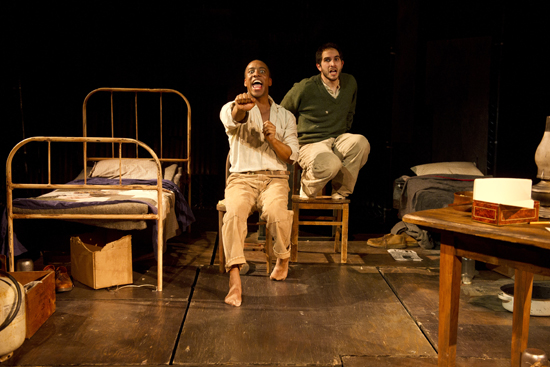Fugard’s Blood Knot Still Resonates
BCAP stages tale of apartheid’s sting

Hampton Fluker (CFA’13) (left) and Mason Sand (CFA’13) portray mixed-race brothers in apartheid South Africa in the College of Fine Arts BCAP production of Athol Fugard’s Blood Knot, which runs through March 2 at the BU Theatre. Photos by Cydney Scott
Athol Fugard’s Blood Knot, a play set in South Africa’s apartheid era about two biracial brothers, one fairer skinned than the other, hit a raw nerve when it premiered in Johannesburg in 1961. Banned in Fugard’s homeland after just one performance, the stinging indictment of the country’s racism starred James Earl Jones when it was staged off Broadway three years later. It debuted on Broadway in 1985 in a production starring Fugard and was nominated for a Tony Award for best play.
As part of its fifth season, the BU College of Fine Arts Boston Center for American Performance (BCAP) is presenting Blood Knot, directed by Thomas Martin (CFA’13), through March 2 at the Boston University Theatre’s Lane-Comley Studio 210.
Searing and intimate, Fugard’s two-character play trains a microscope on the toll of living in a world of institutionalized racism. The poignant drama is the story of two South African brothers, born of different fathers but raised by the same black mother. Morris is portrayed by acting major Hampton Fluker (CFA’13), who appeared in the 2011 CFA production of Hedda Gabler, and the fairer-skinned Zachariah by Mason Sand (CFA’13), a founder of Boston’s Company One, who in 2010 portrayed Hitler in BCAP’s Good. As the play unfolds, the brothers’ relationship grows increasingly tangled and emotionally fraught as Zachariah, despite his brother’s admonitions, falls for a white girl with whom he has only a pen-pal relationship. Their world becomes a bitterly tinged microcosm of their country, where interracial relationships are criminalized, with Zachariah affecting white mannerisms and treating Morris as an inferior.
The brothers “live in a shack next to a lake polluted by industrial waste,” says Martin. “There is no way for them to escape the restrictions placed on them by the white minority government, there is nowhere for them to go. And yet, they dream, they plan, they live, pushing on every day in the face of a broken, demeaning system and country.”

Martin has directed many Boston area productions, including Dead White Males at the Theatre Cooperative and Noises Off at the Footlight Club. Although Blood Knot is set in South Africa during the country’s official apartheid system, whose last traces dissolved in 1994, it reflects themes that have resonance and urgency today in a society “where race influences many of our interactions,” the director says. “We live in a world that has to deal with the death of Trayvon Martin. The Boston school busing crisis of the 1970s is still a topic of conversation.” Just as Zachariah and Morris must find a way to coexist, Martin says, we, too “are all bound to each other. To sever our own blood knot would be disastrous for us all.”
Anti-apartheid activist and Afrikaner Fugard, now an adjunct professor of playwriting, acting, and directing in the University of California, San Diego, department of theatre and dance, has written nearly three dozen plays, among them A Lesson from Aloes, Master Harold and the Boys, and The Road to Mecca, staged by BCAP in February 2011. He received a special Tony Award for Lifetime Achievement in the Theatre in 2011.
BCAP’s production of Blood Knot is a featured event of CFA’s 2012–2013 Keyword Initiative program; this year’s keyword is resilience, with the focus on the buoyancy of the human spirit in the face of adversity.
The professional extension of the BU School of Theatre, BCAP launched its first season in 2008 and has since staged a range of established and original fare, most recently Paul Zindel’s The Effect of Gamma Rays on Man-in-the-Moon Marigolds.
Blood Knot runs through March 2 at the Boston University Theatre, Lane-Comley Studio 210, 264 Huntington Ave., Boston. Performances are Wednesdays and Thursdays at 7:30 p.m., Fridays and Saturdays at 8 p.m., and Sundays at 2 p.m. Tickets are $20 general admission, $15 for students, senior citizens, and groups of 10 or more. Members of the BU community are eligible for one free ticket with a valid BU ID, at the door, subject to availability. Tickets and further information are available here or by calling the box office at 617-933-8600. To get to the BU Theatre, take the MBTA Green Line E trolley to Symphony or the Orange Line to Massachusetts Avenue.
Comments & Discussion
Boston University moderates comments to facilitate an informed, substantive, civil conversation. Abusive, profane, self-promotional, misleading, incoherent or off-topic comments will be rejected. Moderators are staffed during regular business hours (EST) and can only accept comments written in English. Statistics or facts must include a citation or a link to the citation.